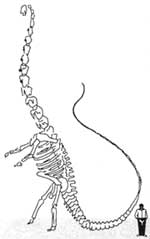To save the planet, first save elephants
Wiping out all of Africa’s elephants could accelerate Earth’s climate crisis by allowing 7% more damaging greenhouse gases into the atmosphere, scientists say. But conserving forest elephants may reverse
Wiping out all of Africa’s elephants could accelerate Earth’s climate crisis by allowing 7% more damaging greenhouse gases into the atmosphere, scientists say. But conserving forest elephants may reverse

Scientists and industrialists are trying to give final shape to a body that will select and fund projects.
Only one per cent of the world's bacteria -- those that can be cultured in the lab -- are known, but molecular techniques pioneered by the Agricultural and Food Research Council (AFRC) in Britain

US scientists postulate the Barosaurus needed more than one heart to pump blood throughout its 15 metre height

An Oxford biologist says sexes exist to prevent chaos within cells during reproduction. And why only two sexes? Because life would get too complicated otherwise.
Certain mouse brain cells have been found to be capable of producing neurons. Scientists say if similar cells are found to exist in the human brain, it will soon be possible to treat nervous disorders.

Engineers are trying to develop a mechanical hand that can handle objects with human sensitivity and prove to be a boon to scientists and doctors.

Bumble bees infected with the larvae of parasitic flies stay the night out in the cold to hinder the development of the eggs

After compact discs, it is the turn of videos to adapt to the digital the format of tomorrow.

Jute fibre, which could provide a solution to the increasing crisis in procuring wood pulp, could be science's gift to the paper industry.
IF YOU are reluctant to leave bed on a dark, winter morning, stay right in there. People who wake up early in winters might be cutting short their required sleep, inviting unforeseen health problems